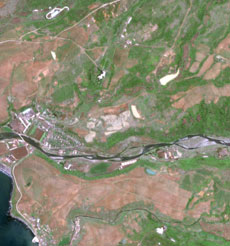N.Korea launches missiles, UN to meet
(Reuters)
Updated: 2006-07-05 12:43
TOKYO - North Korea test-fired at least six missiles on Wednesday, including
a long-range weapon said to be capable of reaching Alaska, ratcheting up
tensions in north Asia and drawing international condemnation.

A satellite image from DigitalGlobe collected
on June 9, 2006 shows Musudan-ri in No Dong, North Korea, the area where a
missile facility is located. Japanese Foreign Minister Taro Aso said on
July 5, 2006 that North Korea launched five missiles including a
long-range Taepodong 2 missile.
[Reuters/DigitalGlobe] | The
long-range Taepodong-2 multi-stage missile apparently failed 40 seconds into its
flight, U.S. officials said.
The U.N. Security Council was to meet later
in the day, at Japan's request, to discuss the latest move by the reclusive
Stalinist state, a French spokesman at the United Nations said.
South
Korea's military stepped up its alert level after the launch, Yonhap news agency
cited a military source as saying.
The two Koreas are technically still
at war more than half a century after the inconclusive truce which halted the
1950-1953 Korean conflict. Some 30,000 U.S. troops remain in South Korea under a
mutual defence treaty.
The United States warned North Korea against any
more provocative acts, and said Washington would take necessary measures to
protect itself and its allies.
"The United States strongly condemns these
missile launches and North Korea's unwillingness to heed calls for restraint
from the international community," White House spokesman Tony Snow said in a
statement.
"We are consulting with international partners on next
steps."
U.S. National Security Adviser Stephen Hadley said the multiple
firings posed no threat to U.S. territory.
He said the launches might
have been a Pyongyang attempt to steal the spotlight away from Iran, which has
been the main focus of U.S. nuclear diplomacy in recent months.
"Obviously,
it is a bit of an effort to get attention, perhaps because so much attention has
been focused on the Iranians," Hadley told reporters.
But like many U.S. officials, he said it was impossible to be
sure about Pyongyang's motives.
|